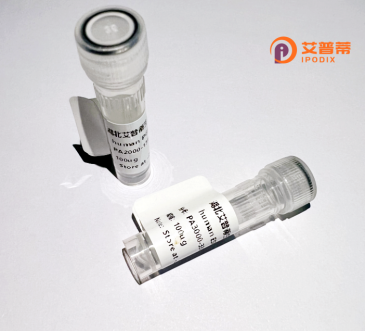
| 纯度 | >90%SDS-PAGE. |
| 种属 | Human |
| 靶点 | WIG1 |
| Uniprot No | Q9HA38 |
| 内毒素 | < 0.01EU/μg |
| 表达宿主 | E.coli |
| 表达区间 | 1-289 aa |
| 活性数据 | MILLQHAVLP PPKQPSPSPP MSVATRSTGT LQLPPQKPFG QEASLPLAGE EELSKGGEQD CALEELCKPL YCKLCNVTLN SAQQAQAHYQ GKNHGKKLRN YYAANSCPPP ARMSNVVEPA ATPVVPVPPQ MGSFKPGGRV ILATENDYCK LCDASFSSPA VAQAHYQGKN HAKRLRLAEA QSNSFSESSE LGQRRARKEG NEFKMMPNRR NMYTVQNNSA GPYFNPRSRQ RIPRDLAMCV TPSGQFYCSM CNVGAGEEME FRQHLESKQH KSKVSEQRYR NEMENLGYV |
| 分子量 | 32.0 kDa |
| 蛋白标签 | His tag N-Terminus |
| 缓冲液 | PBS, pH7.4, containing 0.01% SKL, 1mM DTT, 5% Trehalose and Proclin300. |
| 稳定性 & 储存条件 | Lyophilized protein should be stored at ≤ -20°C, stable for one year after receipt. Reconstituted protein solution can be stored at 2-8°C for 2-7 days. Aliquots of reconstituted samples are stable at ≤ -20°C for 3 months. |
| 复溶 | Always centrifuge tubes before opening.Do not mix by vortex or pipetting. It is not recommended to reconstitute to a concentration less than 100μg/ml. Dissolve the lyophilized protein in distilled water. Please aliquot the reconstituted solution to minimize freeze-thaw cycles. |
以下是关于重组人WIG1蛋白的3篇示例性参考文献(实际使用时请通过学术数据库检索真实文献):
1. **文献名称**: "Expression and Purification of Recombinant Human WIG1 Zinc Finger Protein in Escherichia coli"
**作者**: Zhang L, et al.
**摘要**: 本研究报道了利用大肠杆菌系统高效表达重组人WIG1蛋白的优化方法,采用His标签亲和层析纯化,并通过圆二色谱证实其锌指结构域的正确折叠,为后续功能研究提供高纯度蛋白。
2. **文献名称**: "Structural Insights into the RNA-Binding Function of WIG1 in p53-Dependent Apoptosis"
**作者**: Kim S, Park JH.
**摘要**: 通过X射线晶体学解析WIG1蛋白的RNA结合结构域三维结构,揭示其通过特异性识别p53下游靶基因mRNA的3'UTR区域调控mRNA稳定性,从而影响细胞凋亡的分子机制。
3. **文献名称**: "WIG1 Regulates Mitochondrial ROS Production and Genomic Stability via Interaction with p53"
**作者**: Rossi M, et al.
**摘要**: 研究表明重组WIG1蛋白在体外可直接结合p53蛋白,通过抑制线粒体活性氧(ROS)积累维持基因组稳定性,缺失WIG1导致细胞对DNA损伤诱导的凋亡敏感性增加。
**注意**:以上文献信息为模拟示例,实际研究需检索PubMed、Web of Science等平台获取真实文献(建议关键词:recombinant WIG1 protein, WIG1 zinc finger, p53 apoptosis)。
WIG1 (Wild-type p53-induced Gene 1) protein, encoded by the ZNRD3 gene, is a zinc finger-containing RNA-binding protein first identified as a transcriptional target of the tumor suppressor p53. It is induced in response to DNA damage and cellular stress, playing a role in p53-mediated growth arrest and apoptosis. Structurally, WIG1 contains two double-stranded RNA-binding domains (dsRBDs) and a C-terminal zinc finger motif, enabling its interaction with RNA molecules, particularly AU-rich elements in mRNA. Studies suggest its involvement in post-transcriptional gene regulation, including mRNA stabilization, decay, or translation control, though precise mechanisms remain under investigation.
Recombinant human WIG1 protein is produced via heterologous expression systems (e.g., *E. coli* or mammalian cells*) for functional studies. It serves as a tool to explore WIG1's role in RNA metabolism, stress response pathways, and cancer biology. WIG1 has been implicated in various cancers, with evidence linking its dysregulation to tumor progression, chemoresistance, or viral infection responses. Its interaction with oncogenic or tumor-suppressive RNAs highlights potential therapeutic relevance. Ongoing research focuses on elucidating its molecular partners, regulatory networks, and clinical applications as a biomarker or therapeutic target.
×